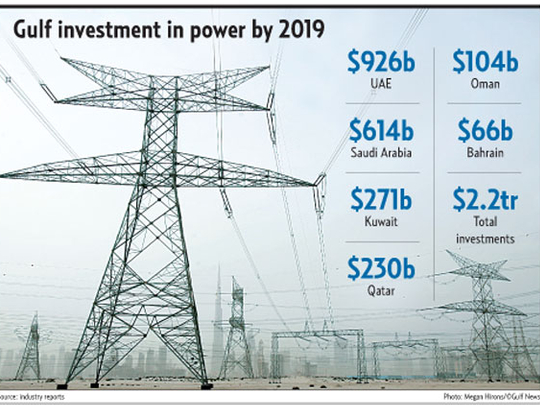
Dubai: The UAE is expecting a 71 per cent increase in primary energy demand by 2019, industry sources said in Dubai on Tuesday at the opening of Middle East Electricity, the region's largest trade show for the power and energy sectors.
The total spend on energy in the region is expected to be $2.2 trillion (Dh8.09 trillion), with the UAE at the top of the list with $926 billion.
The UAE will begin the construction of its first nuclear power plant in the first quarter of next year, with completion expected in 2017.
Anita Mathews, exhibition director for Middle East Electricity 2011, said the show comes at a time when the UAE is expecting primary energy demand to increase. Kuwait plans to double power capacity to 20,000 megawatts (MW) by 2020 and Saudi Arabia's power consumption is set to rise 57 per cent to 65,000MW by 2018.
"Saudi Arabia is expected to spend $614 billion in this sector, Kuwait $271 billion, Qatar $230 billion, Oman $104 billion and Bahrain $66 billion," she said.
Alternatives
The show was opened by Shaikh Ahmad Bin Saeed Al Maktoum, President of Dubai Civil Aviation and Chairman and Chief Executive of Emirates airline and Group, and Saeed Al Tayer, managing director and chief executive of the Dubai Electricity and Water Authority.
In its 36th year, Middle East Electricity at the Dubai International Exhibition Centre focuses on power generation, transmission and distribution; commercial, industrial and residential lighting; water; new and renewable energy; and nuclear energy.
The two energy alternatives that have been embraced in the UAE are solar and nuclear power.
Emirates Nuclear Energy Corporation (ENEC) awarded a $20-billion contract to a South Korean consortium to build two Braka reactors, which ENEC hopes to have up and running by 2020.
Abu Dhabi aims to produce 1,500MW or 7 per cent of its total energy needs through renewable sources by 2020. In a joint venture with Total and Abengoa Solar, Masdar will develop, build, operate and maintain Shams 1, which will be the largest concentrated solar power plant in the world, extending over 2.5 square kilometres.
Dubai (Reuters) The UAE is looking at short-, medium- and long-term solutions for the disposal of used fuel as part of a planned nuclear energy project, an Emirates Nuclear Energy Corporation (ENEC) spokesman said.
The UAE, the world's fourth-largest oil exporter, plans to build four nuclear reactors with a combined capacity of 5,600 megawatts in an effort to meet growing energy demand. The UAE has set up an independent advisory group, the International Advisory Board (IAB), to oversee progress on its nuclear energy project. The group is chaired by Hans Blix, the former director general of the International Atomic Energy Agency. On Monday, the IAB released its first interim report in which it said the country had not yet finalised its waste disposal option.
"The short- and medium-term options are there," a spokesman for ENEC told Reuters yesterday. The long-term strategy is only being developed as we speak."
For the short term, which covers 20-30 years, one solution that will be proposed to the Federal Authority for Nuclear Regulation consists of a spent fuel pool, which will be above the ground and within the plant, the spokesman said.












